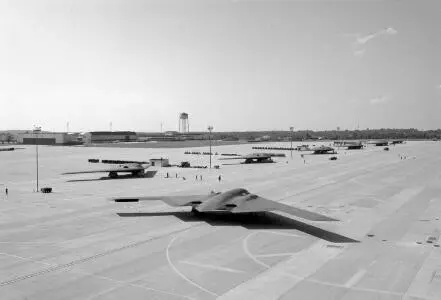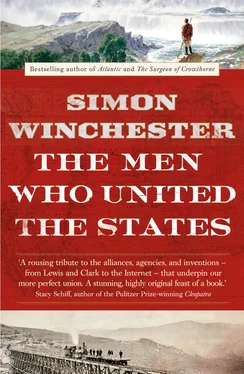1 ...8 9 10 12 13 14 ...26 The command has its headquarters in Louisiana, from where it controls all of America’s air-launched atomic weapons—the three Minuteman missile wings in the northwest and a large number of B-2 stealth bombers, all of them designed to drop thermonuclear bombs. The bulk of these bombers happen to be based at Whiteman—at a site a short way from that point on the river where, in 1804, William Clark recorded hearing an “emence snake” that inhabits a small lake nearby “and which gobbles like a Turkey & may be herd several miles.”
The planes belong to a US Air Force wing, the 509th, that proudly reminds visitors that it is the direct descendant of the only unit in history that has ever dropped live atomic bombs in wartime, on Hiroshima and Nagasaki in 1945. Today it is a battle-proven assemblage of aircraft and crew that, its commander says, can now bring massive firepower to bear, in a short time, anywhere on the globe.

B-2 stealth aircraft of the 509th Bomb Wing, a twenty-strong nuclear-armed operational component of Global Strike Command, at Whiteman Air Force Base, Missouri. The wing is a direct descendant of the group that dropped atom bombs on Hiroshima and Nagasaki.
There seems a certain irony in this nuclear firebase being located so very close to the Lewis and Clark expedition route, not least because what Jefferson’s explorers were seeking to do, even if unknowingly at the time, was tied to the unique American concept of the frontier and to the development of what to this day is known—and argued over—as the frontier thesis. The irony stems from the argument that the frontier mentality, if such a thing truly exists, still plays a nourishing—and controversial—role at the intellectual roots of much of today’s American foreign policy.
The famous argument, put forward in an 1895 paper by a University of Wisconsin history professor, Frederick Jackson Turner, held that there was an immense social significance in the simple existence of the frontier—that ever-westward-shifting margin between civilized society in the East and the untamed savagery and wilderness to the West. Kansas City, the city that rose from one of the campsites of the Lewis and Clark Expedition, became a classic, if momentary, point of frontier contact: on its eastern side were traders, trappers, farmers, settlers, surveyors, villages, and towns; on its western side were empty prairies, nomads, lawlessness, and an unprotected and shelterless void of stony plains, tornadoes, and starvation. Between them lay the line of contact, division, and separation: the frontier.
The rolling clash between these two extremes gave rise, Turner argued, to a peculiarly American set of character traits. The experiences suffered or enjoyed on the frontier left Americans inherently different from what they and their antecedents had been in their homelands. Those tested in the borderlands were by comparison more violent, more informal, more democratic, more imbued with personal initiative, and less hamstrung by tradition, class, and elegance. More American , Turner suggested. Strength, power, might—the ability to tame rather than to persuade, the tendency to demand rather than request, the tendency to shoot rather than to talk—these were all tendencies compounded by the frontier experience, uniquely different building blocks employed in the making of the modern American. The Western myth, the legends of the cowboy, the cinematic and entertainment-park allure of concepts like Frontierland—all of these were born from this single simple (some would say simplistic) thesis offered by Frederick Jackson Turner.
In the century since the publication and promulgation of his views, Turner has been attacked roundly and mercilessly for ignoring such matters as race, gender, and regionalism. Yet what has gone essentially unanswered still remains: just why do Americans believe they are so different, so exceptional? Why the persistent belief in the idea of America as the “shining city on a hill”? Why the notion of Manifest Destiny?
And why, indeed, did Thomas Jefferson believe so keenly in the idea that America should and could and in time would extend herself from sea to shining sea, and accordingly dispatch Lewis and Clark to see if and how this could be achieved? Was all of this, as Frederick Jackson Turner would later argue, rooted in that same peculiar experience, shared by all, born in the process of the steady closing of the frontier?
Some may consider it injudicious to conflate, on the one hand, John Winthrop’s inspirational city-on-a-hill sermon of 1630 and the tenets of the frontier thesis with, on the other, the notion of conducting Manifest Destiny at home and so many interfering adventures abroad. And yet viewed from some perspectives it does seem right and proper to ask, particularly here in Missouri: why does America still believe, as the slogan of Whiteman Air Force Base has it—why did it ever believe, in fact—that it has a right and a duty to be able to deliver “massive firepower, in a short time, anywhere on the globe”? Why America? And if such a belief is somehow rooted in a deep-seated conviction that it should, that it needs to, and if called upon, that it must—then was not this all born, as Frederick Jackson Turner and his supporters would also argue, from the experiences gained by early Americans in their closing of the frontier? Isn’t this determination to extend itself across the planet simply a reflection of the strength and crudity and informal decisiveness of the pioneer Americans, brought up to date, made global, and now writ large for all the world to see?
Does the mission of the huge atomic firebase, sited so close to where William Clark first heard of the snake that gobbles like a turkey , have its intellectual origins in this very same tiny, brave expedition that first crossed the frontier and in the consequent development of the huge city now lying just a short drive away to the east, which once so vividly encapsulated the notion of the frontier, two centuries before?
These days it is by no means easy to see the inner workings of Whiteman. In the 1970s it was simplicity itself to win an invitation for a tour. The air force was only too proud then to show off its wares and its weaponry, reasoning that doing so helped display to the Soviets its perpetual readiness to strike. Today, terrorism has introduced a new reality: long scimitar glints of razor wire, battalions of ever-scanning cameras, and heavily armed sentries at the entrance gates all stand guard to protect the planes and their weapons from the innocently curious and the ill intentioned alike. Tours still happen, but application lines are long, details demanded weeks in advance, cameras forbidden.
Once in a while, though, along this steady reach of the wide Missouri, there will come a distinctively huge and quite unexpected rumbling sound, a thunder of jet engines that shakes the willows and the stillness of the stream. Then from its lair behind the wire, rising from an invisible runway folded among the cornfields, a great gray bomber will slowly lumber upward and hoist itself into the skies.
It is always an awesome sight—all the more so if other planes follow and the singleton becomes part of an airborne armada, a squadron of unimaginable power bound on an unannounced mission to a place no one will ever disclose for a purpose never to be known. 4As the craft vanish into the clouds and the thunder ebbs away over the woods, it is tempting to wonder just what corner of the planet might soon be basking under the unasked-for invigilation of these nuclear-tipped watchers from the skies.
Читать дальше













